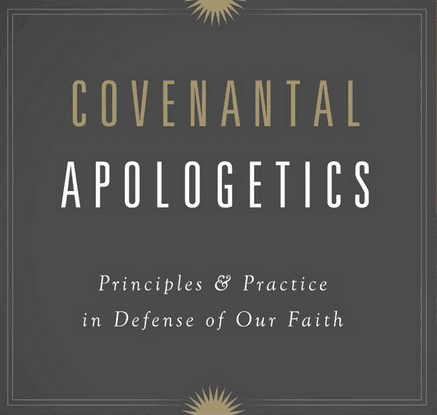⏱️ Estimated Reading Time: 4 min read
Those of us interested in the subject of apologetics find ourselves normally dividing into two categories – presuppositional, interested in engaging with the presuppositions of the unbeliever, or evidential, interested in engaging with the evidence before us. Both of these names can get a bad rap, and their definitions can get watered down or altered over the years. It is helpful to use words that faithfully describe what we are standing for. K. Scott Oliphint suggests that a name change may be in order for how we should refer to our apologetic method. He suggests Covenantal Apologetics, suggesting that we should adopt this word and retire “presuppositional” (25). I think a word overhaul may be a bit extreme, but Oliphint’s intent is good: He wants to be sure we Presuppositionalists continue to hold a biblically-grounded apologetic method, keeping the covenantal story of God and man present. With that said, Covenantal Apologetics is a manual for helping us refine not only how we think about apologetics, but how we go about doing it.
There are some considerable strengths of this book. I love the concept of the Aristotelian trivium of persuasion that Oliphint presents to the reader because the whole of our apologetic should be run through these principles. Our persuasion in apologetics, according to Aristotle and Oliphint, is solidified in three main ways. Ethos is about our character. Pathos is “a proper and personal understanding of those to whom we speak” (146). Logos is the Word, the actual arguments we are making. None of these three can be missing from our work as covenantal apologists. Sometimes, I feel we overemphasize the third principle of the trivium while neglecting the first two, so this section was very helpful and challenging. Before we can be effective apologists, we must do some self-diagnosis, and examine the needs of others.
I also particularly enjoy the mock debates happening between various skeptics and covenant apologists throughout the book. Oliphint includes multiple dialogue sessions in which a covenant apologist presents his arguments to the likes of an atheist objector (Chapter 5), philosopher and scientist Daniel Dennett (Chapter 6), and Muslims (Chapter 7). The conversations are intriguing and help readers become equipped for these kinds of questions when having apologetic discussions.
There are a few shortcomings that I find in Covenantal Apologetics. One is that I feel that this book could be much shorter. I think Oliphint’s ideas could have been slimmed down a bit and made for a shorter book. It is a very meaty 250 pages of material, which can feel tough to get through at times. I also wished there would have been more of an inclusion of the tenets within the book. It felt as if they were presented, then randomly referred to. I think walking the reader through these ideas with more clarity and detail would help readers us grasp Oliphint’s apologetic system.
Another shortcoming is that throughout the book, I was finding myself looking at the footnotes and seeing that in order to expound on an idea or subject, I should refer to another work by Oliphint. I felt that this being the first book by Oliphint I had read was a mistake since it was continually pointing me elsewhere in his writings. I certainly hope to learn from his other books, but this one feels tough to fully grasp the ideas mentioned if you have no background with Oliphint’s previous work.
Overall, I think this book is an important and certainly relevant topic for discussion, and Oliphint does a good job of providing a biblically-balanced, traditionally-savvy, technique-driven apologetic for the reader. I wish there would have been a little more clarity with a little less wording, but if you’re familiar with Oliphint’s prior work, you’ll likely profit even greater.




